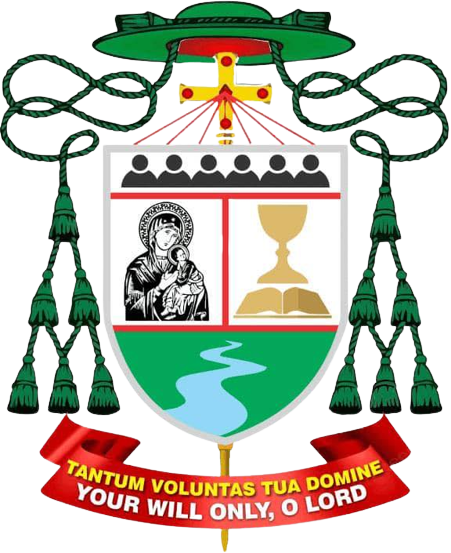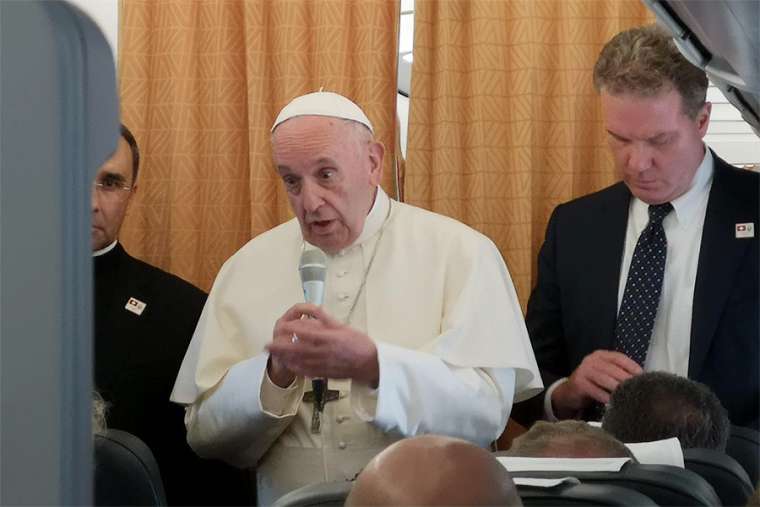CNA Hannah Brockhaus reported that Pope Francis said Thursday that the German bishops’ debate on the reception of the Eucharist by the non-Catholic spouses of Catholics, also referred to as intercommunion, should be decided by diocesan bishops, rather than bishops’ conferences.
Speaking aboard the papal flight from Geneva to Rome June 21, the pope told journalists that the Code of Canon Law leaves decisions about the criteria for intercommunion to diocesan bishops, in order that their decisions will apply only to their individual dioceses, rather than to the Church across an entire country.
The pope said that although the German bishops attempted to establish guidelines through their episcopal conference, “the Code does not foresee that. It foresees the bishop of the diocese, but not the conference, because a thing approved by an episcopal conference immediately becomes universal.”
“The particular Church, the Code permits it, the local Church [episcopal conference] cannot because it would be universal,” Francis elaborated. “The conference can study and give direction and opinions to help the bishops to manage the particular cases,” the pope added.
Canon 844 of the Code of Canon Law generally allows for episcopal conferences to establish norms regarding the circumstances in which non-Catholic Christians may be admitted to the Eucharist.
In the danger of death, or “if in the judgment of the diocesan bishop or conference of bishops, some other grave necessity urges it,” Catholic ministers may licitly administer penance, Eucharist, and anointing of the sick Protestants “who cannot approach a minister of their own community and who seek such on their own accord, provided that they manifest Catholic faith in respect to these sacraments and are properly disposed,” the canon says.
The same canon notes that “the diocesan bishop or conference of bishops is not to issue general norms except after consultation at least with the local competent authority of the interested non-Catholic Church or community.”
The pope’s remarks were in response to a question about a letter he approved, sent from Cardinal-elect Luis Ladaria to the German bishops in May, asking them to study the topic more before publishing guidelines.
The pope added that communion for Protestant spouses of Catholics “in special cases” is not a “novelty,” mentioning again the Code of Canon Law.
The Vatican press office could not be reached for clarification by deadline. During the press conference, Pope Francis also addressed his feelings on the outcome of the day trip to Switzerland, which he undertook for the 70th anniversary of the World Council of Churches, saying the day’s activities of prayer, speeches, meetings, and Mass had all made him happy.
“The right word of the day is ‘encounter,’ and when a person encounters another and feels appreciation for the meeting, this always touches the heart, no? They were positive meetings, good even,” he said.
Francis also addressed the topics of immigration and refugees, the responsibility of religions to promote peace, and ecumenism.
About immigration, he noted that mass-migration is a problem around the world, and that a country should welcome as many refugees as it can integrate and give work to, in light of the virtue of prudence.
The pope also lamented the conditions which many refugees may face if they return to their country of origin, including the increased risk of being trafficked.
Speaking particularly of the United States, the pope reiterated his comments in a recent interview with Reuters, that he backs the statements of the U.S. bishops on the issue. Answering a question on the topic of so-called “pacifist Churches,” which hold that a Christian cannot use or condone violence, Francis refuted the idea that there
are “religions of peace,” as if that implied the existence of “religions of war.”
He said that religious fundamentalism exists, with people who “seek wars,” which it is important to stay alert to, but that during this time, when there is a “crisis of human rights,” all churches should work together to bring about a spirit of peace in the world.
The press conference concluded with Pope Francis presenting a slice of cake to Cardinal-elect Angelo Becciu, currently Substitute of the Holy See Secretariat of
State.
Francis, offering the slice of Sardinian cake, noted that it was Becciu’s last trip withb the pope, because he will soon “change color, but not for embarrassment,”
referencing the archbishop’s recent appointment as a cardinal.

